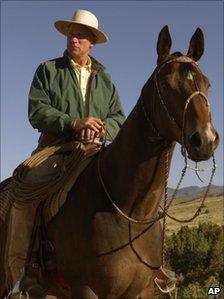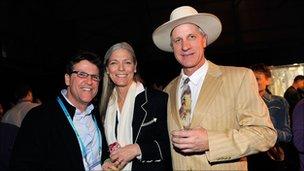Childhood trauma of the real Horse Whisperer
- Published
Buck Brannaman, the model for the animal healer made famous in Robert Redford's film The Horse Whisperer, is the subject of a new prize-winning documentary being tipped for Oscar success. Here he talks about how his difficult childhood brought him closer to the animal world.

Buck grew up in Idaho and Montana - America's cowboy country
"It didn't take much to provoke my dad into a rage - even just a look across the room at him, he might take that as being provoking.
Just a glance at him, he might come across the room and he beats you up like you're a full-grown man in a bar fight.
I got to where I could hardly look anybody in the eye. I just tried to be invisible. I was like a ghost in the room. And I was that way for a long time.
The only place I didn't have to be that way was around the horses. They were quite a salvation for me.
As an adult I realised that there was never a time when my father wasn't abusive.
He knew that he was never going to become a trick roping star, so he pretty much made [my brother and I] into that.
You had the choice of either doing rope tricks or getting whipped. So practising rope tricks looked pretty appealing by comparison.
Once my mom passed away, when I was 11, then it just seemed to get worse week by week.
About that time we were taken away by Johnny France, the sheriff of Madison County, Montana. If he hadn't taken us away I'm positive we probably would have lived only another couple of months.
'Life or death'
My foster parents had a small ranch in Montana and the first foster kid they had was Johnny France - 47 years later, I was the last.
They had four kids of their own and raised 17 other boys over the years. They really couldn't afford to have them but they loved them and it was free - it didn't cost them anything.
Tom Brook looks at a documentary about the man who inspired The Horse Whisperer
After we went to live with our foster parents - it seems crazy to think of it now - but my father would send my brother and I birthday cards and tell us that when we turned 18 that he was going to kill us.
And he'd send us letters during the year telling us that he was watching us through the scope of his hunting rifle from up on the mountainside.
That's kind of a terrifying thing for a 12-year-old boy to have to deal with everyday.
I was so withdrawn and introverted because of the dark things that happened to me earlier in my life. I think horses have been the reason why I was able to open up and turn into what I am today.
The empathy was there from the very beginning. I understood that when the horses are in trouble, it's life or death to them. I understood where they were coming from.
'A great dance'
A lot of people use the term "horse whispering" to describe what I do.
It's meant to be a metaphor - it's not meant to be taken literally, but we all know how literal people can be.

The documentary, Buck, premiered at Sundance film festival this year
So you don't actually take hold of their ears, as if you're taking into an old fashioned telephone and get your point across to them.
Really, what you're thinking of is just working with the horse in a way that you'd like your idea to become his. You set things up in a way that it was as if he got to make up the rules.
To me it's like a great dance. It's like having a dance partner.
My horses work and make a living, no different than I do but they're not my slave - they're my partner. I'm the boss but that doesn't make me any better than them.
I can't believe how many times over the years that people have come to me and said, 'You know Buck, I thought I was going to come to your clinic just to get a little handier with my horse.
'Of course I did get handier with my horse, but I found out that it was about something way bigger than that.
'And this has helped me in the way that I approach other things in life that I didn't think were connected.'
Finding forgiveness
Because of the influence of my foster mother - who was just a wonderful person and she's probably never hurt anybody in her life - I realised that if I didn't forgive [my father] I would have to carry that around with me for the rest of my life.
Even though I was pretty young to make those kinds of decisions I knew that wouldn't be healthy.
So I wrote him a letter, years later, and told him that because he was my dad I still loved him.
I forgave him for all the things that he had done. It was the right thing to do.
- Published22 January 2011